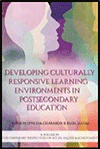
Developing Culturally Responsive Learning Environments in Postsecondary Education
Edited by:
R. Jason Lynch, Appalachian State University
Charmion B. Rush, Western Carolina University
A volume in the series: Contemporary Perspectives on Access, Equity, and Achievement. Editor(s): Chance W. Lewis, University of North Carolina at Charlotte.
Published 2024
U.S. colleges and universities are rapidly diversifying. In 2018, the U.S. Census Bureau estimated that nearly half of undergraduate students were of non-white racial identities, with that number only increasing for future generations. This increase in diversity holds true for many other identity groups. Yet, faculty demographics remain disproportionately white and male. For years, students have called for institutions of postsecondary education to support their success through adopting more culturally relevant practices for teaching and learning. Scholarship on student success in college has also echoed this call. Developing Culturally Responsive Learning Environments in Postsecondary Education was developed to help postsecondary educators answer this call through a multilayered view of student support within the college classroom and beyond.
Specifically, this book features twenty-three chapters divided into four parts. Each part corresponds with four thematic areas identified as an important component in developing culturally responsive learning environments: unpacking educator cultural competence; learning experiences of the 21st century college student; culturally responsive teaching and instruction; and transforming curriculum, content, and environments. Authors representing diverse backgrounds and institutional contexts come together to offer their own scholarly and practical expertise to tackle issues ranging from combating implicit bias and building cultural competence to exploring specific student experiences and practical ways to implement culturally responsive pedagogies. In addition to each chapter, this volume provides a companion case scenario exercise for you to directly apply the content from the book. Ultimately, we hope this book provides you with a meaningful starting place to help you honor the diversity of your students and support their success within your learning context.
CONTENTS
Prologue — How to Use This Book, R. Jason Lynch and Charmion B. Rush. PART I: UNPACKING YOUR OWN CULTURAL COMPETENCE. What Is Cultural Competence in Postsecondary Education? Patricia Hilliard and Callie Edwards. Implicit Bias and the College Classroom, Charmion B. Rush and Cynthia Wooten. Building Cultural Competence, Candy J. Noltensmeyer, Lisa Bloom, and Charmion B. Rush. The Power of Personal Narratives, Chauntee Thrill. PART II: LEARNING EXPERIENCES OF THE 21st CENTURY COLLEGE STUDENT. Building Intersectionality-Minded Learning Environments, Jessica Belue Buckley, Olivia Copeland, and David Nguyen. Culturally and Historically Responsive Pedagogies to Enhance Student Agency in Racialized Learning Environments, Ginny Boss. Strategies and Perspectives of Individuals With Disabilities in Postsecondary Education, Kelly R. Kelley. Creating Restorative and Affirming Classrooms for LGBTQ+ Students, Kris De Pedro, Holly Shim-Pelayo, and Annmary Abdou. Beyond Best Practices: Engaging in Culturally Responsive Strategies to Support Trans* Students in Higher Education, Katy Jaekel. Recognizing Class in the Room: Strategies for Teaching and Learning in Social Class-Conscious and Responsive Ways, Sonja Ardoin and Genia M. Bettencourt. THERE-FOR-U: Supporting Military and Veteran Student Academic Success, Olivia Boyd, Kimberly Tran, and John W. Brooker. “You’re Multicultural, But We Can Fix That!”: The Danger of Deficit Thinking in U.S. Postsecondary Education’s Approach to International Students, Charles Allen Brown. Religious, Secular, and Spiritual Identities, Ashley Staples. PART III: CULTURALLY RESPONSIVE TEACHING AND INSTRUCTION. Inclusive Pedagogy: Foundations for Praxis in the Collegiate Classroom, Brandi Nicole Hinnant-Crawford, Shamella Cromartie, Rebecca Childs, and Erika L. Lett. Communication Styles, Karena Cooper-Duffy. Indigenizing College Teaching, Heather Kind-Keppel and Ruth Harper. Culturally Responsive Digital Learning in Postsecondary Education, Nancy Luke. Trauma-Informed Teaching in Postsecondary Education, R. Jason Lynch and Chateé Omísadé Richardson. PART IV: TRANSFORMING CURRICULUM, CONTENT, AND ENVIRONMENT. Teaching Out of Bounds: Decolonizing Curricula in Higher Education, Emerald Templeton and Emily Jackson. An Interdisciplinary Social Justice Minor: How Do You Create University Level Curriculum Change? Patricia Bricker, Kim Winter, Callie Schultz, Jenny Stewart, and Kelly Tracy. Embedding Culturally Responsive Learning Strategies in the Classroom, Ashley Carpenter. Developing Culturally Responsive Learning Environments in STEM Education, Frim Ampaw, Anne M. Hornak, Caitlin Hamstra, and Taylor Nelson. Do I Fit In? Cultivating Belonging, Mattering, and Community, R. Jason Lynch. Epilogue — Where Do We Go From Here? Charmion B. Rush and R. Jason Lynch. About the Authors.
-
Paperback979-8-88730-465-6
Web price: $62.04 (Reg. 72.99)
-
Hardcover979-8-88730-466-3
Web price: $89.24 (Reg. 104.99)
- eBook979-8-88730-467-0

- EDU048000 - EDUCATION: Inclusive Education
- EDU015000 - EDUCATION: Higher
- EDU038000 - EDUCATION: Student Life & Student Affairs
-
 Advancing Inclusive Excellence in Higher Education
Practical Approaches to Promoting Diversity, Equity, Inclusion, and Belonging
Advancing Inclusive Excellence in Higher Education
Practical Approaches to Promoting Diversity, Equity, Inclusion, and Belonging
-
 Economic, Political and Legal Solutions to Critical Issues in Urban Education and Implications for Teacher Preparation
Economic, Political and Legal Solutions to Critical Issues in Urban Education and Implications for Teacher Preparation
-
 Equity-Based Career Development and Postsecondary Transitions
An American Imperative
Equity-Based Career Development and Postsecondary Transitions
An American Imperative
-
 Imagining the Future
Historically Black Colleges and Universities - A Matter of Survival
Imagining the Future
Historically Black Colleges and Universities - A Matter of Survival
-
 Post-Secondary Planning for All
Approaches to College and Career Readiness Counseling for Special Populations
Post-Secondary Planning for All
Approaches to College and Career Readiness Counseling for Special Populations
-
 Preparing to Lead
Narratives of Aspiring School Leaders in a "Post"-COVID World
Preparing to Lead
Narratives of Aspiring School Leaders in a "Post"-COVID World
-
 Unveiling the Cloak of Invisibility
Why Black Males are Absent in STEM Disciplines
Unveiling the Cloak of Invisibility
Why Black Males are Absent in STEM Disciplines

